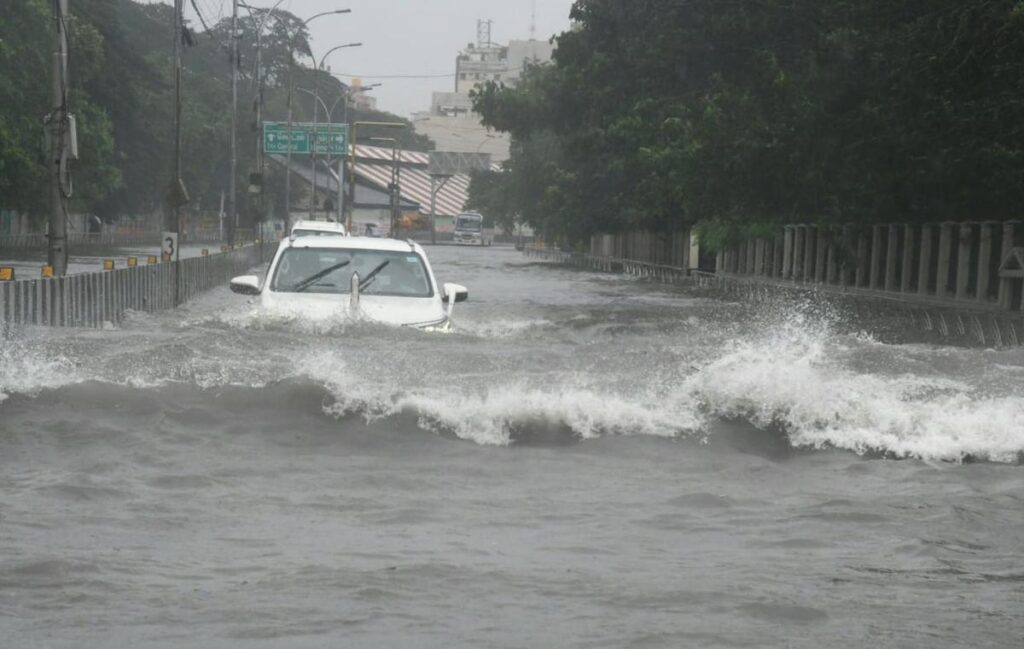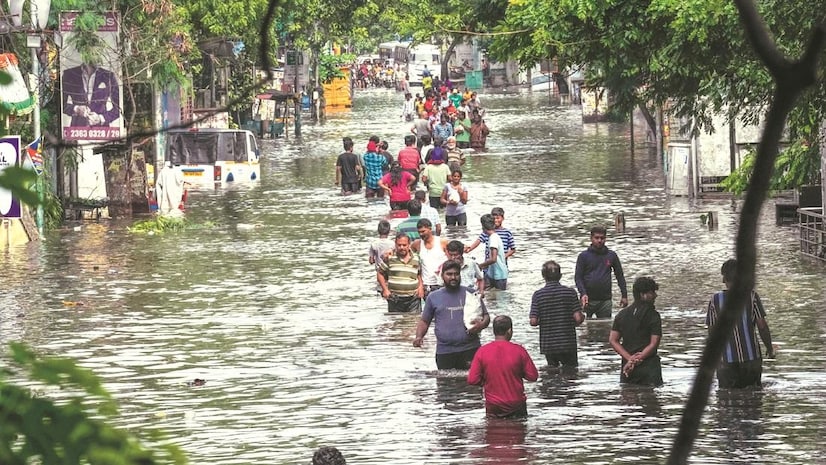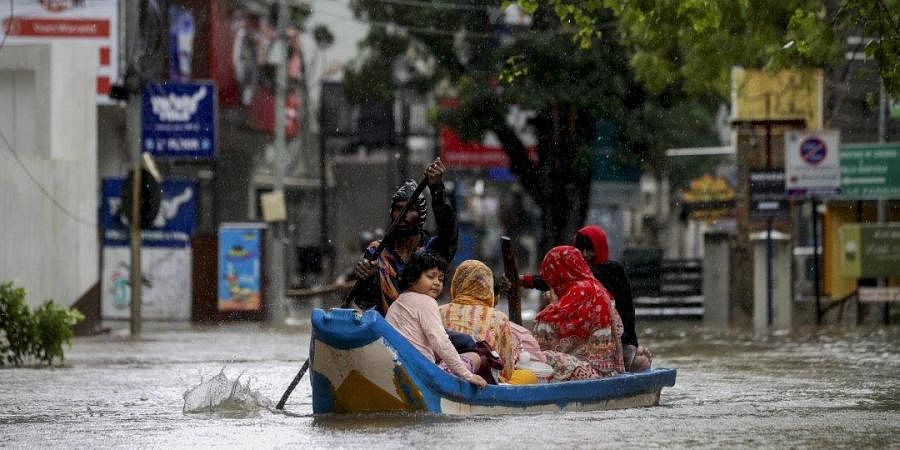Michaung Cyclone and Tips to Buy a house in Chennai
Recently, the entire city of Chennai experienced massive rainfall due to a powerful tropical cyclone that formed in the Bay of Bengal. This caused heavy rains and inundation all over Chennai city. The lakes and rivers were already overflowing and started flooding inland. As many newer residential neighbourhoods in Chennai are built on dried lakes and rivers, we have a persistent problem of inundation on the roads, sometimes flooding the entire ground floor in low-lying areas.
Many of my friends live in posh areas which also got flooded this year because of the heavy rains.

I live on one of the few roads which doesn’t get inundated. The rainwater keeps flowing in our area and doesn’t stagnate. After seeing the situation across Chennai where even the wealthiest areas are flooded, we have to be thankful for these miracles. Like ours, many of our family members also have made good choices while buying a house. I wish to share with you some of the wisdom while buying a house in Chennai.
Buying a house in flood-prone Chennai
We moved back to India after living in the U.S. for more than a decade. When we were buying our apartment in Chennai, the first thing we did was to check the altitude of our neighbourhood and in particular the road where the apartment was built. After my parents and my in-laws experienced the 2015 floods, we became aware of the dangers of buying a house in low-lying areas.
There are numerous posh houses, bungalows, villas, and apartments built in very low-lying areas. It is deceptive marketing and dangerous construction hidden behind big brand names. When you tour any of these places other than november-december time, you would be under the delusional and mistaken assumption that everything is beautiful and life is perfect in these areas. You get a house in these areas for a fraction of the cost of a posh apartment in an older established area.
Anyone would be thinking that this is a bargain. You live out of the mad chaos of the city in a “peaceful” place where you can even afford houses that are on massive plots. This is the beginning of deception. No one tells you that the villa or massive house is built on a dried lake area where the government gave construction approval.
If you look at the roads during non-rainy season, they look neat and clean. The big-name brands offer huge front yards and back yards in a private villa in a gated community. The interior is top-class. You also see that popular schools have sprung up outside the city in the same areas. Imagine living in these massive, comfortable houses and sending your children to the top international schools in Chennai. You look around and see the neighbours have Audis, BMWs, Land Rovers, etc. You immediately assume that this is the kind of community where affluent people live, completely not being aware of the fact that they are probably repaying a huge loan(s) on their vehicles.
Overall, the place seems welcoming. The buying process is extremely simple. You deal with only one builder who is willing to give you a good deal and enable you to buy a move-in-ready villa within no time. The pros are plenty. Or so, you think.
Until the rains hit.
The rains start showing the contour of the city. The area you have bought a house in with all your savings is a marshland. The place gets inundated with the tiniest of rains. You can’t walk to school or neighbourhood shops as the moving cars splash dirty water as they wade in the stagnated water.
Half the time, there is no power during rain. You realize that the kids cannot play in the massive playground during the rainy season. You realize that the front yard and backyard become a mess and stagnate water, nicely increasing the mosquito population in that area. Dengue fever cases rise adding more tension to the residents.
Just when you think that things cannot get any worse, you see that there is a red alert situation coming up warning you of a tropical cyclone bringing massive floods. What can you do? You have already bought the villa, so you are waiting to see if the cyclone brings rain or not.
When the rains hit Chennai, it is not a soothing, enjoyable drizzle. The rain god blesses in plenty. When it rains, it pours like no other city. The non-stop downpour completely brings the city to a halt. Holidays are declared and the schools don’t want to take the risk of having children there.
The rainwater stagnates. The stormwater drains stop working. Where it works, plastic bags and non-compostable items are thrust making water stagnate. As the rain intensifies, the water level increases flooding the cars on ground floors and basements. Sadly, in many cases, the ground floor part of the house which has the living, dining, and kitchen areas gets submerged, destroying one’s precious belongings. You can’t go to the shop to get food supplies as the water is knee-deep, and in some areas, water is waist-deep or neck-deep. We are entering dangerous zones.

You can’t get your car out as it is washed away, drowned, or submerged.
Supplies don’t come to you. You have a family to take care of, but the fate is cruel. You cannot buy food with any amount of money. There is no electricity during floods. You cannot buy diesel to run your home as the petrol bunks stop dispensing diesel during heavy floods. You patiently wait for the boat or helicopters to come and rescue you.

Who is to be blamed for this catastrophe? Is it the government that gave approvals for houses and large apartments to be built in ecologically sensitive zones? Is it the corporate builder who is interested in quickly making a buck by getting plots at dirt-cheap rates and making them into villas that essentially become uninhabitable during rains? Is it you for not understanding the nuances and the cheating system that is essentially out to make a profit at the cost of human well-being?
For every story that we read where a good samaritan has risen to the challenge and helped their neighbours, there are a hundred other contrary stories that never get told. Indeed many people complain that nobody helps them during such floods. The context is very important to understand the gravity of the situation.
Chennai is a popular IT hub and a very popular metro city where all kinds of businesses thrive. Essentially, it is the only massive city in Tamil Nadu where the movie industry, factories and businesses employ millions of people. This is a land of dreams for many village residents in Tamil Nadu. The demand for space has increased the plot rate in the main city area where there are well-established neighborhoods that don’t flood during the rainy season and offer a good life.
Alas, the city is unable to properly support more and more immigrants. If we leave this situation as it is or let it multiply, the city will crumble under its own weight.
Tips to buy a house in Chennai
I personally love Chennai. I have lived here for most of my life, and enjoy the great things that the city offers. With that care and love I have for the city and the people, I propose some ideas to you on how to buy a good house here.
- Check the back story or the history of the area that you want to invest in. It is your life’s savings. Make sure it is not going to sink in the floods.
- Check the altitude of the road where the house is. It should not be at or below sea-level. It should not be lower than the surrounding areas.
- Don’t buy a house or flat that has a basement. Cars parked in basements will drown. So, be wary.
- If possible, buy an apartment on the first floor or if it’s in a very low-lying area, make sure you are considering only second-floor or higher.
- Don’t buy a small apartment in a huge complex. You will have to buy water during summer. Even with massive floods, we haven’t figured out a proper way to fully store all the excess water. Remember: Chennai also has periods of drought.
- Don’t buy a house in a brand-new area. You will probably have to deal with many issues like EB and water connection that you don’t have to deal with in an established area. Probably there will be no sewage treatment.
- Don’t buy a house where there are no street lights or any kind of human activity.
- Don’t buy a house too close to the beach, as Tsunami has happened here in Chennai couple of decades back. Also, the salt water destroys all precious things in these houses.
- Don’t buy the top-floor apartment as the heat gets unbearable during summer and it will heat the bedrooms and living area. You will have to turn the A/C on all the time to overcome it.
- Check the water in the area. Saltwater areas can be avoided.
I will add more to the list as and when I get more ideas.
As of now, I hope this helps. I wish that you and your family live safely and peacefully in this precious city called Chennai which we call our HOME.
Sri Laxmi